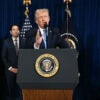
Ratification of the New START treaty was high on the agenda of the so-called “slurpy summit” between President Obama and leaders from both parties at the White House yesterday morning. The President has made adoption of the nuclear arms reduction agreement between the US and Russia by year’s end “a national security imperative.”
While the meeting took place behind close doors, the President had this to say about his two-hour chat with the Democratic and Republicans leaders of the House and the Senate:
I reminded the room that this treaty has been vetted for seven months now; it’s gone through 18 hearings; it has support from senators of both parties; it has broad bipartisan support from national security advisers and secretaries of Defense and secretaries of State from previous administrations, both Democrat and Republican; and that it’s absolutely essential to our national security. We need to get it done.
If only we knew what the treaty actually meant.
Indeed, six months after Members of the Senate Foreign Relations Committee formally requested access to the negotiation records to clarify a crucially important ambiguity in the treaty, New START’s implications remain unclear.
Steven Groves has shown how the treaty’s reference to “the interrelationship between strategic offensive and defensive arms” in the preamble is ambiguous and has been interpreted very differently by the United States and the Russian Federation. The Obama administration and the Russians not only disagree about the meaning of the preamble, they don’t even agree about its legal status. While the State Department maintains the “preambular language is not legally binding,” Russian Foreign Minister Sergei Lavrov says it is “legally binding.”
The Obama administration’s continued refusal to grant access to the negotiation record prevents an informed debate and deliberation in the Senate, thereby obstructing the Senate’s constitutionally mandated role to provide “advice and consent” on all U.S. treaties. As Marion Smith has argued:
This denial is tantamount to refusing the Senate an honest debate and undermines the Senate’s role in providing advice and consent. For many on the Left, however, the lack of debate is not a problem since the virtues of arms control are assumed and any debate is viewed as divisive partisanship. But Senators and the American people should not accept this misunderstanding of the Senate’s function. Policy arguments are not disruptive to the legislative process; informed debate is essential to deliberation.
Like President Washington who enabled Senators to exercise fully their constitutional role by providing negotiation records surrounding the Jay Treaty, President Obama must help the Senate resolve any lingering ambiguities before any vote takes place.































One Reply to “Ambiguities Surrounding New START Treaty Still Unresolved”